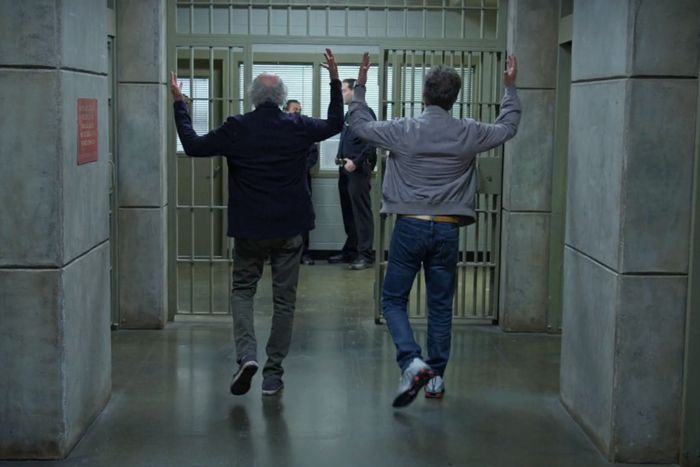
In the series finale of Curb Your Enthusiasm, Larry David is sitting in a prison cell just like Jerry, George, Elaine, and Kramer were in the last shot of the Seinfeld series finale. But unlike that infamous ending from 26 years ago, Larry is saved at the end of Curb when Jerry Seinfeld shows up. Earlier in the season, Larry violated a Georgia voting law by giving water to a woman waiting in line to vote, which culminates in his being sentenced to a year in jail near the end of the finale. But Jerry visits Larry in his cell and reveals that he saw one of the jurors at a Mexican restaurant the night before, and the two riff on the idea of sequestering, ping-ponging back and forth like an old comedy duo:
Larry: He broke his sequester?
Jerry: Broke his sequester.
Larry: He’s supposed to sequester.
Jerry: He’s supposed to sequester.
Larry: He’s a bad sequesterer.
Jerry: You can’t not sequester when you’re supposed to sequester!
Larry: You should be sequestering!
This moment is a callback to earlier in the episode when Larry responds to the judge’s decision to sequester the jury by worrying about a “bad sequesterer.” His lawyer (Sanaa Lathan) tells him not to concern himself with that, but Larry’s anxieties prove correct after Jerry coincidentally tries to talk to the juror at the restaurant because he thinks he looks like Joe Pesci. This forces the judge to call a mistrial, saving Larry from jail. Near the end of the episode, Larry and Jerry walk out of the cell together. It reminded me of the romantic ending of 1982’s An Officer and a Gentleman, when Richard Gere carries Debra Winger out of her workplace (or, more truthfully, the time The Simpsons parodied that scene), but in a completely unsentimental, Larry Davidian way.
In that moment, it becomes clear that despite seasons spent married and then dating, Larry’s great love on Curb Your Enthusiasm the entire time has been Jerry. It’s hard to see without hindsight, considering Seinfeld has appeared on the show only seven times in its 24-year run (mostly during season seven’s Seinfeld-reunion story line), but there is a tension to almost every single interaction on Curb that stems from Larry’s perspective uncomfortably colliding with that of anyone he talks to, and it melts away when the person he’s talking to is Jerry. For example, in the season-seven episode “The Bare Midriff,” Jerry and Larry’s assistant (Jillian Bell) comes into Larry’s office with a titular bare midriff, and the two play out a full conversation just by looking at her stomach and each other.
So much of Curb involves Larry complaining about how no one understands his myriad rules of social conduct, with the other people in the scene either debating him or riling him up. Later in “The Bare Midriff,” Larry and Jerry are at lunch discussing the etiquette of beeping at the car in front of you. After calmly letting Larry extrapolate, Jerry pantomimes a short beep. “The gentle honk!” Larry responds with a smile. They go back and forth on this very specific phenomenon as if it were the most important thing in the world. Jerry understands that this isn’t really about enforcing the rules Larry creates in his mind; he just wants to be heard. Riffing on their observations and stray thoughts is their love language. When Richard Lewis shows up, the bubble bursts.
In the series finale, Jerry expresses his concern by asking Larry what he thinks about while he’s in court all day. Without missing a beat, Larry lays out a hypothetical about what Jerry would do if he learned that a bearded lady who is beautiful after she shaves has a crush on him. For Larry, a worse friend might want to know what he’s feeling, but this is exactly the sort of thing Larry needs at this moment.
Larry and Jerry are like characters in those movies where a human who’s out of step with society falls in love with an alien who’s detached from it. Where Larry is a misanthrope who cares too much and is overly invested in rules and his belief in how things could be, he finds solace in Jerry, a misanthrope who cares too little, if at all. Most of Larry’s relationships are built on conflict, and part of what gave Curb its longevity is that even his friends project their anxieties onto him in ways that generate narrative tension. But Larry and Jerry are complementary: In the choppy ocean of Larry’s life, when he’s with Jerry, the water’s calm. Larry gets to not feel alone, and Jerry gets to feel connected to humanity.
The Curb finale is titled “No Lessons Learned,” a reference to David’s legendary mantra for Seinfeld: “No hugging, no learning.” As Larry tells a little boy earlier in the episode, “I’m 76 years old, and I have never learned a lesson in my entire life.” True to his philosophy, there’s no hugging after Jerry saves him from prison. He doesn’t even say “thank you.” Instead, the two walk down the hallway of the jail, and Larry says, “This is how we should’ve ended the finale” of Seinfeld. Jerry agrees. The characters don’t grow as people — they have learned nothing about themselves — but they are willing to learn a lesson about creating comedy.
That final moment was unplanned. Jerry saving the day was in the script, but he and Larry needed to be together to find the perfect ending to their story. There is no sentiment in the Curb ending; as with Seinfeld, it’s a show about nothing. But that doesn’t mean the nothings don’t matter. Bare midriffs, bearded ladies, and finales of sitcoms — Larry and Jerry find meaning in meaningless things.


